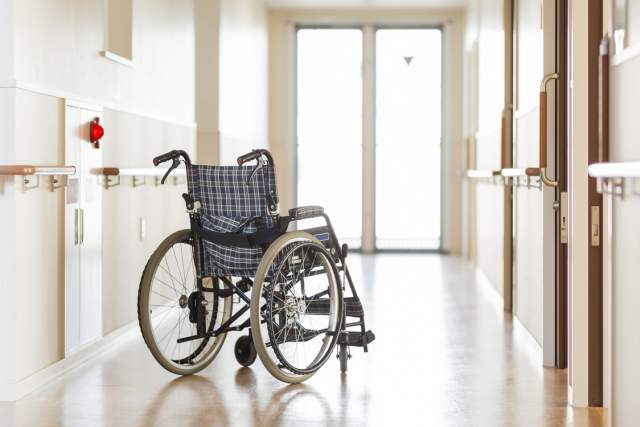In the age of social media, many have come to rely on different platforms for reviews and recommendations for all sorts of goods and services. Whether you’re looking for a pizza joint or a plumber, there are dozens of user-generated review sites you can consult, like OpenTable and Angie’s List. But review platforms aren’t just for casual consumer choices—some of them have begun to offer reviews of health-care providers, such as nursing homes, hospitals, and physicians.

Tuck professor Lauren Lu’s research spans health-care analytics and health IT, retail operations, and supply chain management. She teaches Supply Chain Management in the Tuck MBA program and also teaches in Tuck’s Advanced Management Program.
What sets the health care sector apart from many other services, however, is that it’s heavily regulated by the government; more specifically, the Centers for Medicaid and Medicare Services (CMS). CMS has a legal mandate to provide comprehensive and accurate report cards to the public on the quality of health-care providers, which it does through information-heavy websites such as Hospital Compare and Nursing Home Compare hosted on Medicare.gov.
If you’ve never heard of Hospital Compare or Nursing Home Compare, you’re not alone. Tuck professor Lauren Lu, who regularly researches the health care sector, hadn’t heard of them either until nine years ago. When she did learn of the sites, nobody she asked knew about them. Meanwhile, the highly popular review site Yelp has been reviewing nursing homes since 2005.
And that made Lu wonder: are people more likely to choose a nursing home based on user-generated Yelp reviews, or based on reams of data and inspections by health care professionals? In a new research paper forthcoming in Manufacturing & Service Operations Management—“Does Social Media Dominate Government Report Cards in Influencing Nursing Home Demand?”—Lu and her coauthors Yuanchen Li and Susan Feng Lu report the answer to that question.
According to CMS, there are about 15,600 nursing homes in the U.S., serving roughly 1.3 million patients. CMS rates these facilities on three parameters: health inspections, staffing, and a quality measure.
It’s very rigorous and anyone can view the full inspection results and reports, which detail the number of complaints, reported issues, infections, and even how much time nurses spend on each resident compared to national averages.
— Lauren Lu, Professor of Business Administration
“It’s very rigorous,” Lu says of the ratings process, “and anyone can view the full inspection results and reports, which detail the number of complaints, reported issues, infections, and even how much time nurses spend on each resident compared to national averages.”
As the researchers note in their paper, these reports are more than just words and numbers: academic literature has shown that high quality ratings are associated with better patient outcomes, and they induce patients to choose highly rated providers.
Nursing home ratings on Yelp are a different matter. First, Yelp only has ratings for about 28 percent of U.S. nursing homes. Second, the ratings are user-generated and mainly anecdotal, and there might be just a handful of ratings for each facility. And finally, Lu explains, “User reviews are typically bipolar: extremely good or extremely bad. The middle is pretty much silent.”
Yelp comes up with a composite rating of a nursing home by taking an average of its historical consumer ratings. This can result in a rating that is skewed high or low, depending on the number of reviews. Take, for example, a nursing home in New Hampshire that has three reviews: 4 stars, 1 star, and 5 stars. Yelp would rate this facility as having 3.5 stars. Meanwhile, the CMS rating for the same facility is 5 stars. In this case, Yelp users might steer clear of the same nursing home that would beckon to other people using Nursing Home Compare.
Lu and her co-authors quantify this dynamic. Using resident admissions as a proxy for consumer demand, they find that higher Yelp ratings led to higher consumer demand, particularly among Medicare-covered consumers. Furthermore, when they compared the effect of Yelp ratings against those of the CMS ratings, Yelp came out on top. They find that a 1-star increase in a Yelp rating increased a nursing home’s Medicare admissions by 2.6% more than a 1-star increase in the CMS rating did. This effect is primarily driven by the disproportionate number of extreme ratings on Yelp.
This dominance of Yelp ratings is moderated by a few factors. It was mostly observed in markets with high Yelp penetration, and it was more pronounced in areas where the average education level, based on Census data, was low to medium. “In markets where Yelp has a lot of public awareness, the effect is stronger,” Lu says, “and Yelp is more influential among people who are not necessarily highly educated.”
We advise nursing home operators to proactively manage their reputation on social media by promptly addressing consumer complaints and implementing quality improvement measures.
What might this “Yelp effect” mean to the finances of a nursing home? According to the researchers’ back-of-the-envelope calculations, a nursing home gets a $33,500 boost to its net income on average for each 1-star increase in its rating. Which is actually quite a bit. “Many nursing homes have an annual revenue around a few million dollars,” Lu says, “and they are often operating at a low margin, so this is a sizable net income gain.”
Given social media’s strong influence on consumer demand, Lu and her co-authors assert that it’s time for the government to collaborate with sites such as Yelp to promote public awareness of rigorous rating services like Nursing Home Compare. State departments of health already do something like this, publishing restaurant hygiene scores on Yelp. This would allow consumers to make more informed decisions about health-care providers. Moreover, nursing homes themselves need to realize that Yelp ratings matter, and can really impact the bottom line. “We advise nursing home operators to proactively manage their reputation on social media by promptly addressing consumer complaints and implementing quality improvement measures,” they write.

